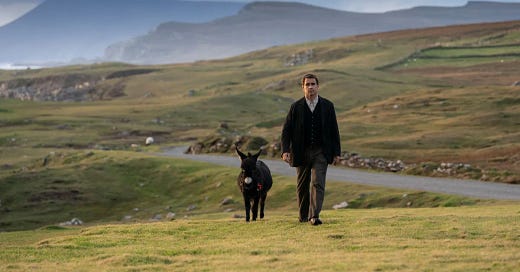“The Banshees of Inisherin” Is Heartfelt, But Too Cold and Abrasive For Its Own Good
Martin McDonagh’s impassive filmmaking turns an endearing story of friendship into a somewhat banal narrative
The Banshees of Inisherin stands out in the abrasive and somewhat mean-spirited filmography of Martin McDonagh as a story with a genuine interest in the value of kindness and comradery. McDonagh’s filmmaking has always maintained a level of impassivity despite any genuine emotional groundwork. However, The Banshees of Inisherin is an instance where McDonagh allows his work to be empathetic and kind, replacing cool abrasiveness with a heartfelt chronicle of two friends’ lives.
The Banshees of Inisherin is one of the most visually exceptional movies of the year, and its creative and technical aspects alone are phenomenal enough to merit it praise. The sprawling but intimate bleakness of Inisherin is beautifully captured by cinematographer Ben Davis, although it feels like a crime to have shot all of the landscapes digitally. The costumes and production design, paired with Carter Burwell’s sweeping score, are all noteworthy additions to the haunting ambiance, giving the film a distinctly cozy and timeless mise-en-scene.
McDonagh has always excelled in writing dialogue, although he struggles in fleshing out good characters because he treats them simply as vessels for his composition. Though the characters are rich and thoughtfully composed in The Banshees of Inisherin, they are occasionally deprioritized for the sake of snappy comebacks and quips. The uniformly incredible performances prevent the characters from becoming totally flat deliverers of dialogue, and Colin Farrell, Brendan Gleeson, and Kerry Condon deliver some of the best performances of their respective careers.
However, as the story continues, The Banshees of Inisherin transforms from kindness and empathy to shallow intensity. The movie seems so disinterested in itself by the third act that it becomes more mean-spirited than empathetic. We are constantly aware that the story is an adjacent chronicle to the Irish Civil War, existing as a kind of banal allegory reflecting the conflict occurring just a few miles away from the characters’ small island town. During the final act, The Banshees of Inisherin connects the story to its historical context, but the conclusion seems surprisingly antithetical to the film. The final moral reckoning is oddly jarring, considering how the movie had been consistently contextualized within wartime, seemingly stating that the banality of a conflict over nothing is a good thing.
McDonagh seems to want to leave the viewers with a moral reckoning that is more aesthetic than it is profound, and what he proposes is the idea that violent socio-political conflict constantly perpetuates itself, but its inevitability is not necessarily something to look down upon. The conclusion is surprisingly timid and comfortable when contrasted to the intensity of the previous 90 minutes and considerably devalues the film.
OVERALL SCORE: 7/10
The Banshees of Inisherin was released on October 28 and is currently in US theaters.





I felt similarly when finishing this film. I'd genuinely enjoyed the majority of it but my admiration faded in the last third. I think your analysis of the contradictory ending is spot on.
where are the clipboards?